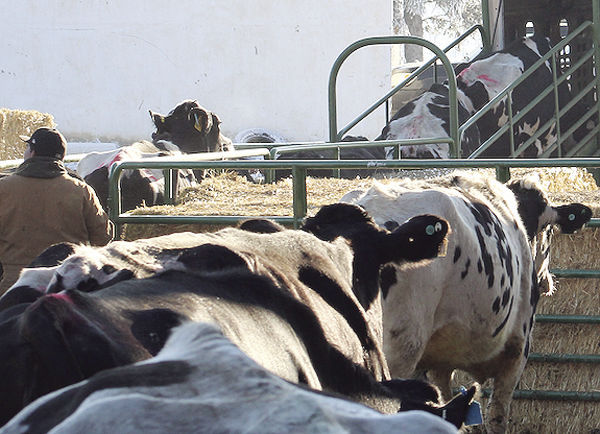
It’s a long trip for these cows to arrive at their new home in South Dakota. To help lessen stress, they are loaded on the truck within two hours of having been milked and not unloaded until they arrive at their destination.
The Daytona Dairy in Dayton, which is near Preston, has passed into the history books when load after load of semitrailers moved 2,900 cows to their new homes last week.
The decision to sell was a difficult one for owner John Gomez, said his manager, Miguel Serna, on Dec. 12.
But a lack of demand for the milk and falling milk prices is behind the move he said.
Story continues below video
“There are 20,000 too many cows in Idaho, Mexico has increased its dairies by 120 percent, and Canada is no longer taking our milk,” he said.
The number of cows in the state has increased annually by about 20,000 animals to its current level of 600,000, said Idaho extension agent Ben Eborn.
“That’s unreal,” he said.
Idaho is currently the fourth-highest dairy producing state in the nation.
Locally, before the sale of Daytona’s dairy cattle, Franklin County dairy cattle numbered 14,500. Ten years ago, it was 11,500, according to the USDA.
But at the same time, Canada raised its own quota and Europe has lifted its quotas, making it possible for their own dairymen to produce more of their own needs and lessening their need for U.S. dairy products, Serna said.
“It’s true, there is a glut of dairy products around the world,” Eborn said.
But it’s not just the number of cattle that have created the problem. It’s the number of years there were low prices on dairy products and the lack of processors.
“We had three bad years. That’ll hurt anyone,” Eborn said, and prices are actually up a dollar from last year, he continued.
But dropping from $18 a hundredweight to the current $15.60 is the situation Daytona Dairy found itself at the end of its last contract. And futures point to continued price drops.
“We just break even at $15.50 per hundredweight,” Serna said.
To compound the problem, they couldn’t find another processor to take their milk, he said.
The state could use “another Chobani every four years to keep up with demand,” Eborn said.
Chobani is a processing plant that makes yogurt in Twin Falls.
Closing the Daytona Dairy puts 32 people out of work, many of them who have been living in housing provided by the dairy, and who have families.
It also cuts into other local businesses.
“We do a lot of business with the tire companies and Northstar Dairy Services,” Serna said.
Tony Rawlings, owner of Northstar Dairy Services, which is a dairy equipment supplier, said the closure would impact his company, as has the continual reduction of the numbers of dairies both in Franklin County and the region.
“I’ve been dealing with a shrinking market for years,” Rawlings said. “Dairy numbers are probably at least half of what they used to be 10 years ago. To deal with that, we expanded our area. That’s how we’ve compensated, otherwise we’d be cutting back forces and help and wouldn’t be able to do what we do.”
Locally, the number of dairies in Franklin County in the last 10 years has dropped by about 50 percent, Rawlings estimated.
Nevertheless, the Daytona Dairy was a large customer and the impact will be wide.
“It’s a sales loss in volume,” Rawlings said. “He was a pretty big dairy for those dairies we service. It’s a loss for the community. It’s not a good deal.”
He’ll have to send his 12 employees further away to generate the income the local dairy provided, he said. Rawlings also has an office in Nephi, Utah.
Serna is hopeful for the dairy’s former employees. Gomez is trying to place them with other dairymen he knows, and the property is being considered seriously for purchase by two buyers interested in ag-related businesses, Serna said.
Source: idahostatejournal.com









